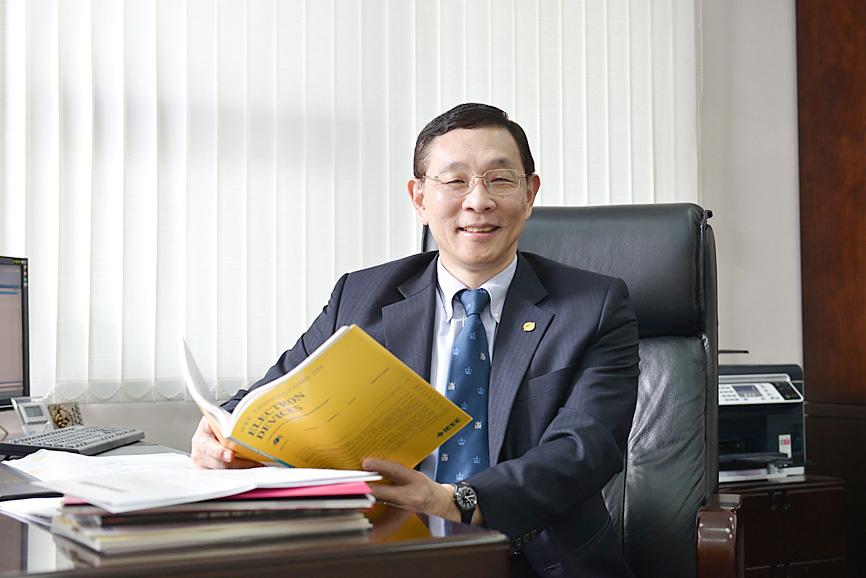Macronix International Co (旺宏電子), the world’s biggest NOR flash memorychip maker, yesterday said its revenue would grow quarter-on-quarter in the second half of this year due to resilient demand and price hikes.
The forecast goes against a broader downtrend in the semiconductor industry, which has begun experiencing inventory corrections after COVID-19 restrictions, inflation and Russia’s invasion of Ukraine dented market consumption.
“With half of the year having passed by, the company does not see any dark clouds over the NOR flash memory business. The outlook for next year is not certain yet, as the war, [COVID-19] pandemic and China’s zero COVID policy will affect the whole situation,” Macronix president C.Y. Lu (盧志遠) told an online investors’ conference.

Photo courtesy of Macronix International Co
The company is very confident that its revenue would grow quarter-on-quarter this quarter, Lu said.
Increased demand for NOR flash memory chips used in vehicles would fill the capacity void left by chips used in consumer electronics, he said.
The company expects factory utilization to remain at full capacity through the end of this year, he said.
The company’s book-to-bill ratio did slide from a large figure last year, but it is still well above one, meaning that demand is surpassing what it can supply, he added.
Macronix supplies advanced ultra-high-quality memory chips to the world’s top five automotive chip suppliers, including NXP Semiconductors NV, Renesas Electronics Corp and STMicroelectronics NV.
Addressing investors’ concerns about the increase in its inventory, Lu said that about half of the company’s inventory has been prepared for Nintendo Co ahead of the shopping season in the second half.
Following seasonal patterns, the company expects to deplete the inventory by the end of the year, he said.
Macronix said its net profit surged 52 percent to NT$2.94 billion (US$98.28 million) last quarter, compared with NT$1.93 billion a year earlier. It was little changed from NT$2.93 billion in the first quarter.
Earnings per share rose to NT$1.59 last quarter, from NT$1.04 a year earlier and NT$1.58 a quarter earlier. Gross margin fell slightly to 48.2 percent last quarter from 48.3 percent in the second quarter. On an annual basis, gross margin improved from 39.1 percent.
In the first half, net profit hit a new high of NT$5.86 billion, more than double the NT$2.84 billion recorded over the same period last year. Earnings per share climbed to NT$3.17 from NT$1.54.

Vincent Wei led fellow Singaporean farmers around an empty Malaysian plot, laying out plans for a greenhouse and rows of leafy vegetables. What he pitched was not just space for crops, but a lifeline for growers struggling to make ends meet in a city-state with high prices and little vacant land. The future agriculture hub is part of a joint special economic zone launched last year by the two neighbors, expected to cost US$123 million and produce 10,000 tonnes of fresh produce annually. It is attracting Singaporean farmers with promises of cheaper land, labor and energy just over the border.

US actor Matthew McConaughey has filed recordings of his image and voice with US patent authorities to protect them from unauthorized usage by artificial intelligence (AI) platforms, a representative said earlier this week. Several video clips and audio recordings were registered by the commercial arm of the Just Keep Livin’ Foundation, a non-profit created by the Oscar-winning actor and his wife, Camila, according to the US Patent and Trademark Office database. Many artists are increasingly concerned about the uncontrolled use of their image via generative AI since the rollout of ChatGPT and other AI-powered tools. Several US states have adopted

KEEPING UP: The acquisition of a cleanroom in Taiwan would enable Micron to increase production in a market where demand continues to outpace supply, a Micron official said Micron Technology Inc has signed a letter of intent to buy a fabrication site in Taiwan from Powerchip Semiconductor Manufacturing Corp (力積電) for US$1.8 billion to expand its production of memory chips. Micron would take control of the P5 site in Miaoli County’s Tongluo Township (銅鑼) and plans to ramp up DRAM production in phases after the transaction closes in the second quarter, the company said in a statement on Saturday. The acquisition includes an existing 12 inch fab cleanroom of 27,871m2 and would further position Micron to address growing global demand for memory solutions, the company said. Micron expects the transaction to

A proposed billionaires’ tax in California has ignited a political uproar in Silicon Valley, with tech titans threatening to leave the state while California Governor Gavin Newsom of the Democratic Party maneuvers to defeat a levy that he fears would lead to an exodus of wealth. A technology mecca, California has more billionaires than any other US state — a few hundred, by some estimates. About half its personal income tax revenue, a financial backbone in the nearly US$350 billion budget, comes from the top 1 percent of earners. A large healthcare union is attempting to place a proposal before